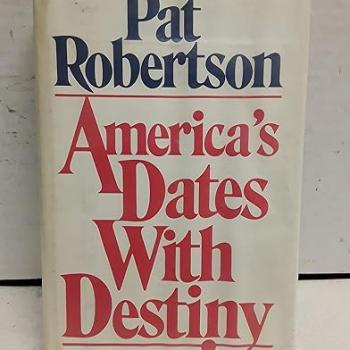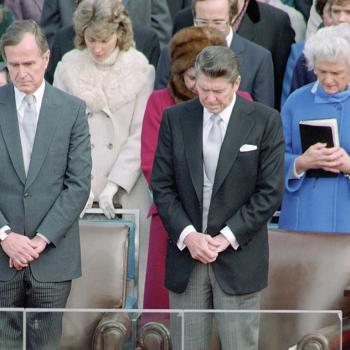In case you have not heard, last week Thomas Nelson, a Christian publisher based in Nashville, ceased publication of David Barton’s The Jefferson Lies: Exposing the Myths You’ve Always Believed About Thomas Jefferson, saying it has “lost confidence in the book’s details.”
Since its publication earlier this year, The Jefferson Lies has been attacked by historians and other critics for errors in historical accuracy and interpretation. Warren Throckmorton and Michael Coulter of Grove City College, neither of them historians, were still able to come up with enough errors in The Jefferson Lies to fill the pages of an entire book of their own, Getting Jefferson Right: Fact Checking Claims About Our Third President. I read that book in manuscript and found it to be a convincing refutation of many of Barton’s claims about our third president.
A group of evangelical pastors in Cincinnati called for a boycott of Thomas Nelson over Barton’s book, particularly in its approach to Jefferson’s views on slavery and race. Ten conservative historians chosen by Jay W. Richards, senior fellow at the Discovery Institute (an organization perhaps best known for promoting the validity of the “intelligent design” view of the origins of the universe), found The Jefferson Lies to be loaded with what Richards called “embarrassing factual errors, suspiciously selective quotes, and highly misleading claims.” (The Anxious Bench’s Thomas Kidd did some fine reporting here).
With so many people condemning Barton’s “scholarship,” Thomas Nelson had no other choice but to remove the book from publication and stop its distribution. (I should also add that the decision took place one day following a National Public Radio story on Barton, but I have no idea if that story played a part in Thomas Nelson’s decision to pull the book).
If Barton was shaken-up by the Thomas Nelson decision, he is certainly not showing it. As expected, he and his followers are using the opportunity to trash the publisher and the “godless,” “liberal,” and “elite” historians who pressured Thomas Nelson to drop the book. I am sure Glenn Beck has already weighed in on his behalf. His fans on the Wallbuilders Facebook page are fired-up. Rick Green, his right-hand man at Wallbuilders, compared historians and writers who are critical of Barton to Adolph Hitler. And Barton recently went on a radio program and suggested that Throckmorton’s criticism of his book was somehow linked to the Grove City College professor’s views on homosexuality. Barton promises to prove that all of his critics are wrong. Green says that he is “ready to rumble.”
Through it all, Barton continues to insist that his interpretation of Thomas Jefferson is accurate despite overwhelming evidence to the contrary. When legitimate historians criticize his work he paints them as godless and liberal. But can all these historians and critics be wrong? Apparently David Barton is the only one out there who has correctly interpreted Thomas Jefferson. This kind of arrogance not only shows a deep disrespect for the work of historians, many of whom have devoted their lives to the study of Jefferson, but, perhaps more importantly, it is an embarrassment to the Christian church. Perhaps Barton needs to take a lesson from Rev. Dudley Rutherford, the evangelical pastor who misinterpreted the story of the Star-Spangled Banner. When Rutherford, the pastor of Shepherd of the Hills Church in Porter Ranch, California, learned that his YouTube presentation contained several inaccuracies, he quickly apologized and pledged to look deeper into the historical record.
But even if we allow Barton to dismiss non-Christian historians, he will have a hard time dismissing his fellow evangelicals. Many of his critics have very solid evangelical credentials. Throckmorton is a Romney supporter (or at least “likes” Romney on his Facebook page) and is a conservative evangelical Christian. When I spoke at Grove City College in January 2012, he apologized for having to miss one of my lectures. It turns out that Throckmorton is an elder at his local Evangelical Free Church and had to attend a meeting there on that particular night. Ray McMillian, one of the Cincinnati pastors who led the boycott of Thomas Nelson, runs an organization called “Race to Unity.” Speakers at Race to Unity events have included evangelical luminaries such as Tony Evans, Joseph Stowell, Ed Dobson, and Bill Hybels.
Gregg Frazer, one of the ten historians chosen by Jay Richards, teaches at The Masters College, a school founded by popular evangelical preacher John MacArthur. (Frazer has also written an excellent book on the religious beliefs of the founding fathers which I highly recommend). Glenn Sunshine is a graduate of Trinity Evangelical Divinity School in Deerfield, IL—certainly not a bastion of godless liberalism. Charles Dunn, who has endorsed Getting Jefferson Right, is a Distinguished Professor in the School of Government at Pat Robertson’s Regent University. Even the folks at WorldView Weekend, an organization that used to partner with Barton, have turned their collective backs on him.
I recently took an informal survey on my blog and learned that the history departments at some of the most conservative or fundamentalist colleges in the country, such as Bob Jones University, Liberty University, and Patrick Henry College, do not, and will not, use Barton’s books in their classes. Actually, the only place I could find that does use Barton’s books appears to be Liberty University Law School. Though I realize that this is only a rough survey, it is worth noting that historians at these kinds of institutions also reject Barton’s pseudo-history. If you are a David Barton fan, and you have a college-age son or daughter, you will be hard pressed to find a Christian college history department in the United States who embraces his views.
Yet Barton continues to press on. I imagine that the debates over the proper interpretation of American history and the role of Thomas Jefferson within it, will now get more intense. Barton, Green, and the Wallbuilders staff will have a tough row to hoe. But in the meantime, here are a few important lessons to take away from the entire Jefferson Lies controversy.
First, when the past is used to promote political agendas in the present it usually leads to bad history. It is very easy to find something useful in the past that serves a particular political agenda. This is the ultimate form of indoctrination by historical example. For example, those who want to prove that the roots of the United States were Christian can find quotes from the founding fathers in which they reference the importance of God or Christianity to the moral health of a successful republic. Similarly, those who want to prove that the roots of the United States were secular in nature can find quotes from the founders in which they champion religious freedom or deny essential theological doctrines that have always been at the heart of Christian faith. This kind of selective cherry-picking does little to help us understand the past in all its fullness. Though it might be an effective way of winning political points in our ongoing culture wars, it is simply bad history.
Good history demands understanding the past on its own terms, rather than recreating historical figures to suit contemporary needs. I think Barton is correct when he claims that the Left has sometimes misused Jefferson. For example, it is customary on the Left to refer to Jefferson as a “Deist.” As I argued in Was America Founded as a Christian Nation, he was not a Deist. But neither was he an orthodox Christian. Rather than interpreting Jefferson from the perspective of a historian, Barton has chosen to interpret Jefferson from the perspective of a culture warrior. Historian Gordon Wood has said that if someone wants to use the study of the past to change the world he should forgo a career as a historian and run for office. His advice applies to both the Left and the Right.
But David Barton has carried this fundamental historical error to another level. He has become so fixated upon stealing Thomas Jefferson from the scholarly and political arsenal of the American Left that he has allowed himself to play fast and loose with the historical record.
Second, the Barton controversy reminds us that, even amidst postmodernist attacks, truth exists and it is the historian’s responsibility to pursue it. Of course no historian can understand what happened in the past with absolute certainty. We are often too removed from the past to be able to paint anything close to a complete picture all that happened in a particular era. Even the best collections of primary sources only provide us with a small glimpse of the mentality of our historical subjects. We see through a glass dimly and, as a result, we must remain modest and humble about our findings. But this does not mean that historians should abandon the pursuit of truth, stop trying to figure out what happened in bygone eras, or cease to analyze and critique the work of other historians based on how they have used whatever resources are available for getting at the truth.
David Barton claims to be a great defender of truth against all those liberal professors who have sold their souls to the gods of postmodernsim, poststructuralism, and deconstructionalism. But this entire Jefferson Lies controversy reveals that even the historians who Barton condemns are very concerned about examining the past truthfully. My favorite comment about this whole dust-up came from Jim Cullen, the author of many excellent books on American popular culture. After hearing about Thomas Nelson’s decision to drop Barton’s book, Cullen jotted off a quick Facebook post: “Maybe there is such a thing as Truth.” If Cullen is right, and there is such a thing as Truth, then in this case Barton does not seem to be on its side. It looks like his seemingly heroic defense of historical truth has backfired on him.
Third, the Barton controversy reveals that there is still a fundamental misunderstanding about the role of primary sources in the doing of history. Barton defends The Jefferson Lies by counting the number of footnotes in the book and claiming that his research is based upon original documents. So far this has been enough to convince his followers that his interpretation of Jefferson is accurate. A quick look at the Wallbuilders Facebook page suggests that the leading reason people continue to defend The Jefferson Lies amidst the damning criticism is because Barton claims that the book is well-documented.
I have no doubt that every Jefferson quotation that Barton cites in The Jefferson Lies comes from a legitimate Jefferson document. (This has not always been the case with Barton. He has been known for using false quotes from the founders). But in order to provide a historically accurate portrayal of any person or event in the past one must interpret such documents. This requires examining particular quotes in the context of the given era or in relationship with other quotes from the same author. The criticism of The Jefferson Lies stems not from Barton’s citation of original documents or his ability to amass footnotes, but from the way he has used the available documents to reconstruct Jefferson’s life. Barton seems more suited to be an editor and compiler of a book of quotations than a writer of history.
Barton has apparently already secured a new publisher for The Jefferson Lies. Stay tuned.












